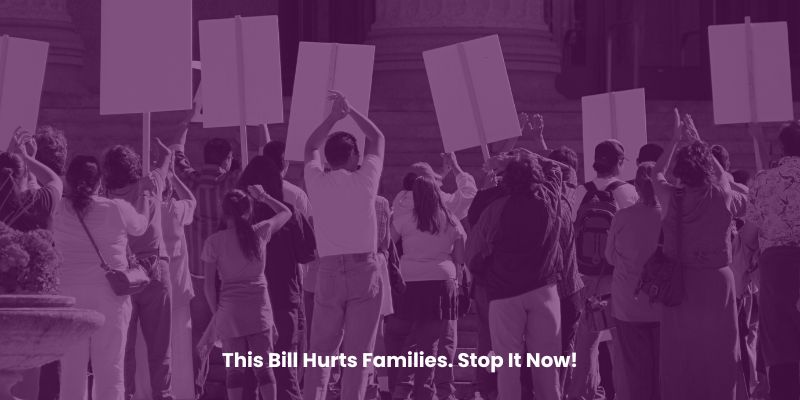
This Budget Reconciliation Bill Is Cruel—and It Targets Immigrant Families
The federal budget reconciliation bill currently making its way through Congress is anything but “beautiful.” It is a cruel, misguided, and immoral attempt at punishing, by all and any means possible, immigrants of all stripes. Whether you’re an undocumented immigrant, a refugee with temporary protection, an asylum seeker, a victim of domestic violence, a legal permanent resident, or even a U.S. citizen born to any of the above, the proposed bill would impact you.
Healthcare on the Chopping Block
The cruelty of this bill is very real. For example, people who have been granted authorization to live in the United States but are not legal permanent residents would be barred from critical healthcare services through Medicare or even the Affordable Care Act marketplace. This means that your 65-year-old mother fighting cancer would lose her Medicare coverage - even though she has lived, worked, and paid taxes into the Medicare program her entire adult life.
This also means that young people brought here as children who have received DACA protections would be unable to buy health insurance through the ACA marketplace. DACA recipients fighting chronic illness would lose their coverage, almost overnight.
The reconciliation bill also proposes a cut to Medicaid expansion funding by 10 percent for states that use their OWN money to cover low-income, undocumented immigrants. Again, people who are working, paying taxes, and contributing to our economy would lose healthcare coverage in their home state, almost overnight. The 14 states that currently have some sort of health care coverage for undocumented immigrants can either end those programs or face drastic Medicaid funding cuts that would ultimately impact not only undocumented people in those states but the entire Medicaid population. Congress is further attempting to divide working people, using immigrants as the scapegoats.
Targeting Children and Working Families
Other areas of deep concern are changes to the widely popular and supported child tax credit. The reconciliation bill would bar U.S. citizen children with social security numbers from accessing the credit if their working parents use a taxpayer identification number (ITIN) to file their taxes. This change would kick more than 2 million children off this widely well-regarded program.
Misplaced Priorities
This bill is currently in the Senate and action is expected soon and while the White House has attempted to sell it as a fiscally conservative budget, the truth is that this bill would add more than $2 trillion dollars to the national debt, give large corporations and the wealthiest people in the world massive tax cuts, all on the backs of working people and using immigrants as a scapegoats.
At the onset of the Trump administration, AP-OD, in collaboration with BSP Research and UnidosUS, conducted a national poll of nearly 1,400 Latino families with young children. Overwhelmingly, respondents stated that the top 12 concerns they hoped Congress and President Trump would address include: improving wages and income, addressing the high cost of living, creating affordable housing, lowering health care costs, protecting immigrant rights, and addressing gun violence, among others. Latino families overwhelmingly oppose the drastic and punishing funding cuts proposed in the federal budget reconciliation bill.
We Can Still Stop This
We know the U.S. House of Representatives has already failed us by passing this draconian proposal. In the days ahead, the Senate has the opportunity to do the right thing. This isn’t about budgets—it’s about values. And right now, immigrant families are being told they don’t matter.
Let’s be clear: This bill doesn’t reflect fiscal responsibility—it reflects political cruelty. It prioritizes tax breaks for the ultra-wealthy while stripping healthcare and economic support from those who need it most.
But it's not too late.
You can Take Action Today by contacting your members of the U.S. Senate here. Contact their offices and ask them to uplift our families instead of punishing and demonizing us.

